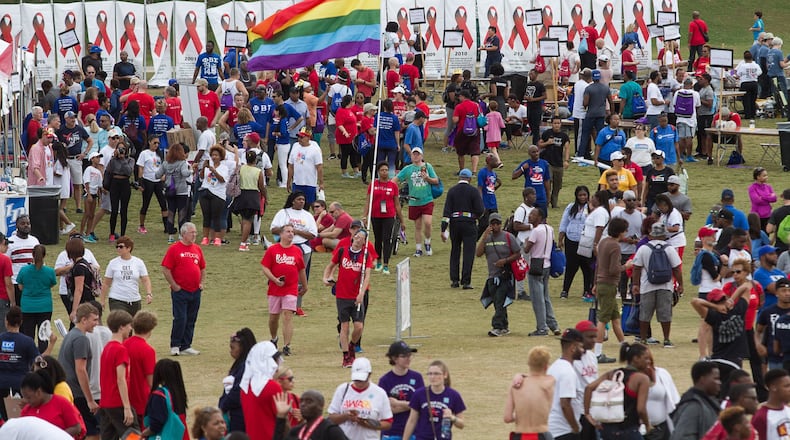Last month, Georgia Rep. Betty Price set off a national firestorm when she asked a state health official whether people with HIV could be legally quarantined.
It wasn’t the first time the word and HIV, the virus that causes AIDS, ended up in the same sentence, of course. We heard it a lot in 1985, when 51 percent of respondents in a Los Angeles Times poll supported quarantining AIDS patients.
No quarantines went into effect, and it’s highly unlikely one ever will.
Just as in 1985, Price, who later said her comments were taken out of context, got plenty of backlash.
AIDS United, on behalf of the National Minority AIDS Council and several other national nonprofits focused on ending HIV in the United States, called Price's line of questioning during the House Study Committee on Georgians' Barriers to Access to Adequate Health Care disturbing.
“Rep. Price’s comments referring to people living with HIV as ‘carriers’ dehumanize individuals living with and affected by HIV, and perpetuate stigma,” said Jesse Milan Jr., president and CEO of AIDS United, a national nonprofit focused on ending the AIDS epidemic in the United States. “Discussing quarantine, in any context, is archaic and extremely painful to the millions of families and friends who have lost loved ones in Georgia and across our nation.”
The committee is scheduled to resume hearings at 10 a.m. Thursday in Room 506 of the Coverdell Legislative Office Building across from the state Capitol.
Price said Friday that HIV/AIDS was never the focus of the committee hearings. Barriers to access to health care was.
“I think this is an issue that inserted itself,” she said. “It was not the high point of the mission of the committee.”
Still, Milan said that the question coming from a public health official — Price is an anesthesiologist and her husband, Tom Price, is an orthopedic surgeon and former U.S. health secretary under the Trump administration — who is married to a public health official made it all the more offensive.
While the prospect of a quarantine might be foolhardy, I know few who would argue that the HIV/AIDS epidemic shouldn’t be included in discussions about barriers to health care and particularly here in Georgia.
When it comes to lifetime risk of infection — the likelihood of contracting HIV at some point during one’s life — Georgia ranks third in the nation behind D.C. and Maryland.
What’s more, in some Southern states, people living with diagnosed HIV are three times as likely to die as those living with HIV in some other states, said Milan, who has been living with the virus for 35 years.
Overall, seven of the eight states with the highest HIV death rates were in the South, including Georgia, which has the sixth-highest death rate in the country.
Leading those numbers are people who look like me, people of color who make up half of new HIV infections and more than half of deaths in the country.
“Those stats are surprising to too many people, including communities of color,” Milan said.
Because access to HIV care for African-American populations all across the South may be dependent on states expanding Medicaid coverage, he said state legislators across the South have a unique role to play.
“We can’t win the national fight against HIV unless we win it in the South,” he said.
If you’re wondering why an HIV hurricane is happening in the South, Milan said we’re to blame. We still refuse to accept the LGBTQ community. We’re deeply homophobic. And discriminatory.
Add to that, he said, the fact that despite all of the biomedical advances, access to prevention like PrEP or pre-exposure prophylaxis still lacking and quite frankly unheard of in many cases. (PrEP is a new HIV prevention approach where HIV-negative individuals use anti-HIV medications to reduce their risk of becoming infected.)
While condom use is a consistent part of the HIV prevention tool box, Milan said PrEP needs to be added post haste.
“There is no doubt that, to date, condoms have been the most widely available and consistently effective tool for preventing HIV infections,” he said. “That being said, condoms were essentially the only HIV prevention tool at our disposal for over 30 years, and for most of the last decade, new infection rates failed to budge at all.”
According to Milan, the gay, bisexual and, in particular, transgender communities face multiple barriers to health care that are tied to their disproportionate burden of HIV, especially among LGBTQ people of color.
Those include structural challenges like poverty, racism, homophobia, and sexual violence.
“Add increased rates of substance use and mental health challenges, lower rates of health care coverage, the South’s near-universal rejection of Medicaid expansion, and lack of regional investment in health care infrastructure, and you have a convergence of barriers to care not seen in scope or intensity anywhere else in the country,” he said.
While these challenges have persisted for decades and are rooted in the complex social, cultural and even geographical conditions that exist in the South, expanding Medicaid and expanding investment in efforts to bring recent biomedical advances to minority and underserved populations would do much to advance the cause of LGBT health equity in the region. In addition, he said, passing inclusive laws that protect against discrimination and promote the safety and dignity of LGBT and other gender nonconforming Southerners, people of color, women and immigrant communities would have a massive impact.
This kind of transformational change Milan is advocating to address these barriers won’t come easy, but little will change without it.
About the Author
Keep Reading
The Latest
Featured





